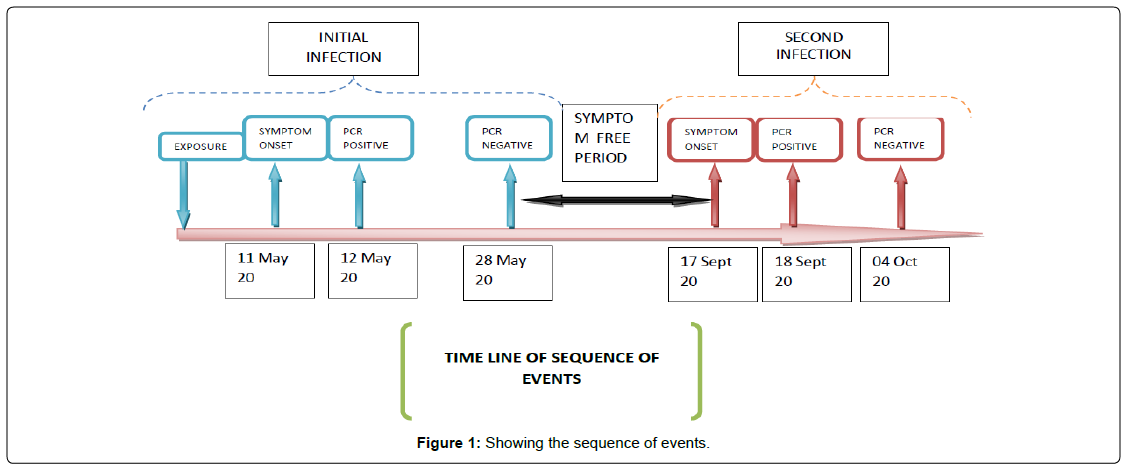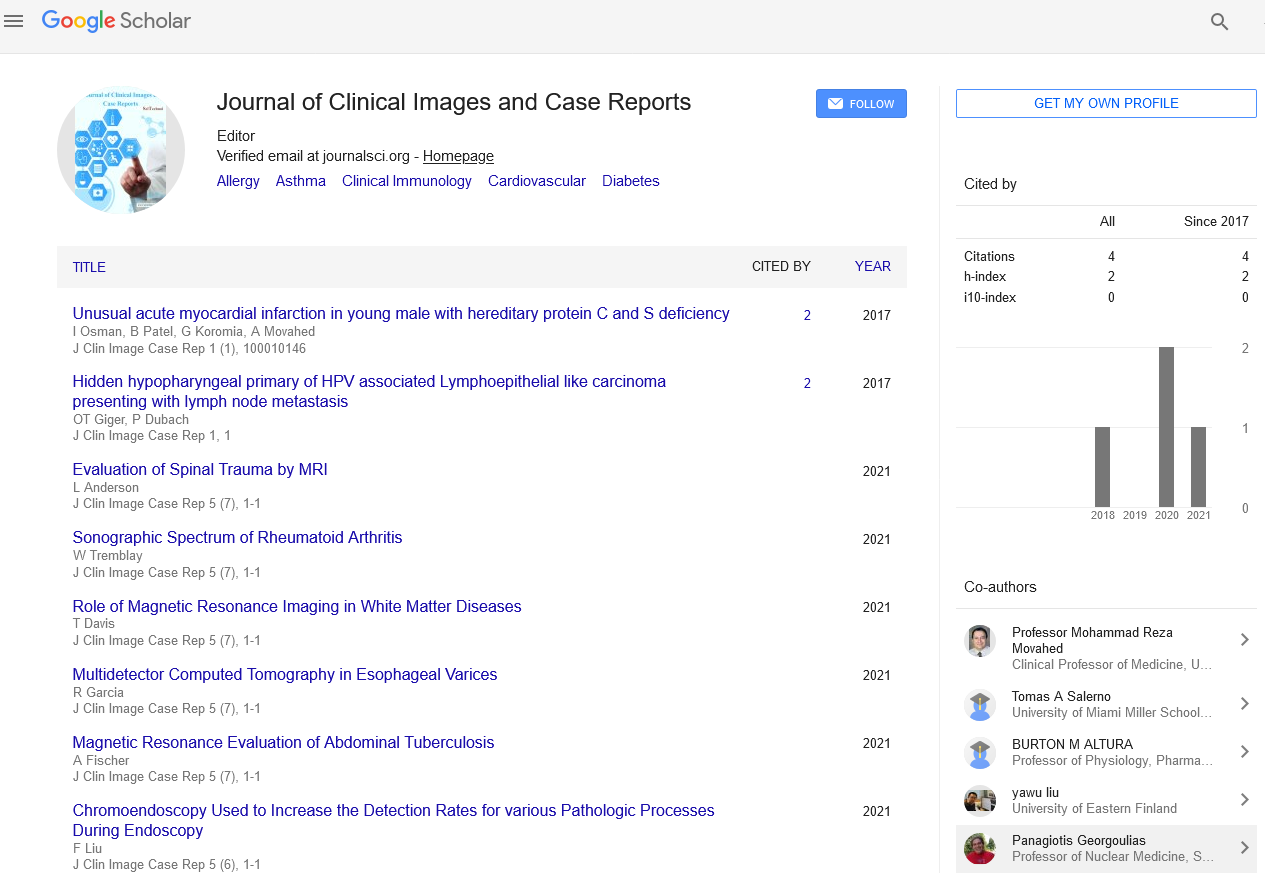Case Report, J Clin Image Case Rep Vol: 5 Issue: 9
Re-infection with SARS-CoV-2: a Case Report from North-Western India
Neetha TR, Jitu Mani Kalita, Nitin Baajpayee, Vidhi Jain, Ravisekhar Gadepalli*
Department of Microbiology and Nephrology, All India Institute of Medical Sciences, Jodhpur, Rajasthan, India
*Corresponding Author: Ravisekhar Gadepalli
Additional Professor, Department of Microbiology, All India Institute of Medical Sciences, Jodhpur, Rajasthan, India
Tel: 919680009207; Pin: 342005
E-mail: gadepallirs@gmail.com
Received: July 30, 2021 Accepted: September 01, 2021 Published: September 08, 2021
Citation: Neetha TR, Kalita JM, Baajpayee N, Jain V, Gadepalli R (2021) Re-infection with SARS-CoV-2: A Case Report from North-Western India. J Clin Image Case Re 5(9): 179.
Abstract
Introduction
Re-infection due to SARS CoV-2is reported in low numbers round the globe. It is significant to understand each reinfection cases.
Case Report
We present here a case of 44 year old healthcare worker with a probable case of re-infection with SARS CoV-2. The symptoms during the second episode were more severe than the first episode. The RT-PCR cycle threshold (Ct) values during both the episodes were consistent with the positive report. The IgG antibody detected after the second episode may show that more severe symptoms imply a more robust immune response. Conclusion: The severity of symptoms, antibody responses, infectivity was profound during the probable SARS CoV-2 reinfection.
Keywords: SARS-CoV-2, Re-infection, IgG antibody, HCW
Case Report
The immune response against SARS CoV-2 re-infection is difficult to understand. Some cases doesn’t show any detectable antibody responses after the infection which may be because of waning immunity, which means presence of antibody against SARS CoV-2 is still not an absolute rule after infection and more studies are needed in this regard [1]. Confirmed re-infection cases due to SARS CoV-2 are sparsely reported around the world. The underreporting of cases, false positivity in the detection assays, continuous viral shedders in the population may attributed for this. Here we are reporting a case report of SARS CoV-2 re-infection spaced with 120 days between the confirmatory RT-PCR assays.
A 44 year male healthcare worker (HCW) residing in northwestern India had presented to COVID-19 screening area at a tertiary care hospital with sore-throat as the primary symptom. His nasopharyngeal and throat swab samples were taken on the subsequent day for SARS CoV-2 RT-PCR testing and was tested positive. After 14 days of home quarantine, the samples were tested negative for SARS CoV-2 by RT-PCR assay. The HCW was enrolled for COVID IgG antibody testing after 3 months and no detectable antibody were found. There was a symptom free period of 120 days during which routine hospital duty was carried out by the HCW.
After three and half months, he developed fever, myalgia, breathlessness, and drop in oxygen saturation (92%) and was hospitalized in the COVID ward and his vitals were stable after admission without oxygen support. Nasopharyngeal and throat swabs were obtained from the patient in the viral transport medium after the day of onset of symptom and were sent to Viral Diagnostic and Research Laboratory of the same institute. The RNA extraction was carried out using TRUPCR COVID-19 Viral RNA extraction kit (Kilpest India Limited, India) as per manufacturer’s instruction. The SARS CoV-2 IgG antibody detection was performed using ICMR approved COVID Kavach IgG ELISA kit (Zydus Cadila Healthcare Ltd. Ahmedabad, Gujarat, India) against whole viral lysate in both the episodes. He was treated with Remdesivir, dexamethasone and heparin during the second episode. After 15 days of hospitalization, he was tested negative for SARS CoV-2 by RT-PCR assay.
To best of our knowledge and literature search this is the first case report of SARS- CoV-2 re-infection from a HCW in Northwestern India. The present case showed a pattern of severe sign and symptoms during the re-infection which is similar to case reports from Ecuador and North America, but there was no difference in severity of symptoms among reports from Belgium, Netherlands and Hong Kong [1-4]. A case report of SARS CoV-2 re-infection from Turkey showed severe symptoms in both the episodes [5].
The theories regarding the severity of SARS CoV-2 re-infections are many. One of them is that a different viral strain may have caused infection in the second episode, which does not react with the SARS CoV-2 neutralizing antibodies. Second, the individual may have exposed to higher viral load in the second episode. Third, waning of immune response after the initial SARS CoV-2 infection may have caused the individual to become susceptible to re-infection. The antibody dependent enhancement might also be the cause of the severity in the re-infection episode, where Fc bearing immune cells became infected with the virus [1]. The present case did not have any co-morbid or immunosuppressive condition. The source of initial infection was from a patient under his care and that of the second exposure is unknown. The two episodes of infection were spaced with a symptom free period of 120 days (Figure 1) [6-8].

Figure 1: Showing the sequence of events.
Conclusion
There is considerable dilemma regarding the protective antibody responses after the SARS-CoV-2 infection. The frequency of SARS CoV-2 IgG antibodies in the community vary widely according to time of testing in different geographical regions and most of the studies has shown the development of IgG antibodies after 15-28 days. In the current geographical area the seroprevalence was found to be 6-10% in the general population. The IgG antibody was detected after the second episode of SARS-CoV-2 infection against whole viral lysate antigen. This can be attributed to low level of antibody response after the infection in certain populations. The negligible level of antibody produced after the infection, needs more sensitive assays for evaluation. SARS-CoV-2 reinfection may present with more severe symptoms. Infection control practices should be followed rigorously to combat this. Routine testing in health care workers could provide an opportunity to collect systematic data to better understand the prevalence of re-infection in a defined population.
Acknowledgement
None
Conflict of Interest
None to declare
Data Availability Statement
The data that support the findings of this study are available on reasonable request from the corresponding author. The data are not publicly available due to ethical restrictions from the institute.
References
- Tillett RL, Sevinsky JR, Hartley PD, Kerwin H, Crawford N, et al. (2021) Genomic evidence for reinfection with SARS-CoV-2: a case study. Lancet Infect Dis 21(1): 52â??8.
- Prado-Vivar B, Becerra-Wong M, Guadalupe JJ, Marquez S, Gutierrez B, et al. (2020) COVID-19 Re-Infection by a Phylogenetically Distinct SARS-CoV-2 Variant, First Confirmed Event in South America SSRN.
- Selhorst P, Ierssel SV, Michiels J, Marien J, Bartholomeeusen K, et al. (2020) Symptomatic SARS-CoV-2 reinfection of a health care worker in a Belgian nosocomial outbreak despite primary neutralizing antibody response. Preprint available from medRxiv.
- Parry J (2020) Covid-19: Hong Kong scientists report first confirmed case of reinfection. BMJ.
- Ozaras R, Ozdogru I, Yilmaz AA (2020) Coronavirus disease 2019 re-infection: first report from Turkey. New Microbes New Infect 38: 100774.
- Galanis P, Vraka I, Fragkou D, Bilali A, Kaitelidou D, et al. (2020) Seroprevalence of SARS-CoV-2 antibodies and associated factors in health care workers: a systematic review and meta-analysis medRxiv 108: 120-134
- Murhekar MV, Bhatnagar T, Selvaraju S, Saravanakumar V, Thangaraj JWV, et al. (2021) SARS-CoV-2 antibody seroprevalence in India, Augustâ??September, 2020: findings from the second nationwide household serosurvey. Lancet Glob Health.
- Dave M, Vijayvargiya R, Poswal L, Bedi V, Sharma M, et al. (2020) Study of COVID-19 Seroprevalence Among Healthcare Workers at Dedicated COVID Hospital in Southern Rajasthan. Ind J Clin Prac 31:5.
 Spanish
Spanish  Chinese
Chinese  Russian
Russian  German
German  French
French  Japanese
Japanese  Portuguese
Portuguese  Hindi
Hindi 